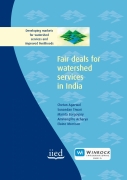International Institute for Environment and Development (IIED)
Assessment of India's preparedness: Implementing effective social protection
Posted on 27 Dec, 2023 08:48 AMClimate change poses urgent risks, especially for vulnerable communities. Social protection programs, traditionally focused on poverty alleviation, now play a crucial role in building climate resilience.

Slow onset climate-induced disasters leaving migrants at greater risk of human trafficking
Posted on 10 Jul, 2022 06:30 PMPeople migrating to escape slow onset climate disasters like drought are two and a half times more likely to experience trafficking or modern slavery than those people fleeing rapid onset disasters like floods or cyclones, according to new research conducted in two states in India by IIED.

Long-term resilience through MGNREGS assets
Posted on 23 Apr, 2022 11:47 AMThe Mahatma Gandhi National Rural Employment Guarantee Act is one of the largest social protection programmes in the world, providing guarantee of income to some 55 million people every year.

New hope for Indian food security? The System of Rice Intensification – A paper by International Institute for Environment and Development
Posted on 29 Oct, 2011 11:43 AMThis paper from the gatekeeper series of the International Institute for Environment and Development (IIED) describes the potential of an innovative rice cultivation practice-the system of rice intensification (SRI)—for allowing Indian rice farmers to not only enhance rice production and their net incomes, but also to solve the water crisis.
Groundwater, self-supply and poor urban dwellers - A review with case studies of Bangalore and Lusaka by IIED
Posted on 24 Aug, 2011 08:32 PMIt investigates the difficulties they face and emphasizes the need for better integration of groundwater in the planning and management of urban water resources.
Developing markets for watershed services and improved livelihoods: Fair deals for watershed services in India - An IIED research paper
Posted on 07 May, 2010 10:51 PM The report presents field experiences and lessons in developing Incentive-based Mechanisms (IBMs) for watershed protection services and improved livelihoods at micro and macro-scales, derived from an action-learning project in India at three locations in the states of Himachal Pradesh (HP) and Madhya Pradesh (MP).
The report presents field experiences and lessons in developing Incentive-based Mechanisms (IBMs) for watershed protection services and improved livelihoods at micro and macro-scales, derived from an action-learning project in India at three locations in the states of Himachal Pradesh (HP) and Madhya Pradesh (MP).
An inter-village transaction was facilitated at one site (the Kuhan micro-catchment in HP), while at the second site (Suan micro-catchment in HP) a transaction failed to materialize despite initial interest. At the third site in MP, there was interest in undertaking a transaction between the city of Bhopal and the catchment of its lake, the Bhoj Wetlands.
The action research has yielded insights into the role of hydrological information, types of incentive mechanisms, the importance of institutions and the implementation of IBMs.
Markets for watershed protection services and improved livelihoods in India: a policy brief by Winrock International India
Posted on 11 May, 2009 04:05 PMThe study is based on a scoping study on ‘Developing Markets for Watershed Protection Services and Improved Livelihoods in India,’ which Winrock International India (WII), New Delhi, undertook as part of a larger international study being carried out by the International Institute for Environment and Development (IIED), London.